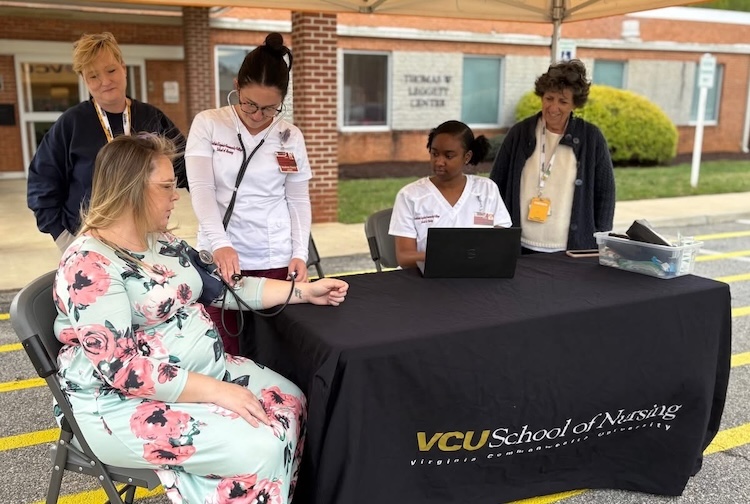$1.1M grant to expand behavioral care for underserved youth, Latinx immigrants, refugees in Richmond
September 21, 2017
 A Virginia Commonwealth University psychology professor has received a $1.1 million grant to increase the number of psychology doctoral students who provide behavioral health care to underserved youth, Latinx immigrants, and refugees in the Richmond region.
A Virginia Commonwealth University psychology professor has received a $1.1 million grant to increase the number of psychology doctoral students who provide behavioral health care to underserved youth, Latinx immigrants, and refugees in the Richmond region.
Heather Jones, Ph.D., an assistant professor in the Department of Psychology in the College of Humanities and Sciences, received the four-year grant, “The VCU Primary Care Psychology Training Collaborative: Expanding Services with Underserved Youth, Latinx Immigrants, and Refugees,” from the U.S. Health Resources and Services Administration.
The grant will increase the number of psychology doctoral students who work with the Primary Care Psychology Training Collaborative, a VCU program that provides pro bono treatment for a variety of behavioral health and mental health issues in primary care clinics. Commonly treated issues include depression, child behavior problems and ADHD, and sleep issues.
“All three of our targeted populations — underserved children and adolescents, Latinx immigrants, and refugees — are vulnerable, particularly at this moment in time in the United States,” Jones said. “The vast majority of our patients live in federally designated medically underserved areas. Right now, the future of our current health care and immigration policies are unclear, and some of our patients — including children — have reported stress related to current national events. Unfortunately, wait lists for behavioral health appointments can be months long.”
Through this grant, she said, the program will be able to provide free, brief behavioral health services for the targeted patients without a wait list.
“The research is very clear that mental health and physical health have a reciprocal relationship,” Jones said. “So, when you can improve mental health, people are better able to take care of their physical health. This is a win-win situation for everyone — us, the medical teams with whom we partner, and our patients.”
By partnering with organizations that provide primary health care in the Richmond community, the psychology doctoral students will be able to learn more about delivering evidence-based behavioral health care in a primary care setting, she said.
Meanwhile, she added, medical staff, including residents, will gain exposure to behavioral health care, thereby increasing the likelihood that patients get referrals to the team's behavioral health services when they need them.
“We work with the medical staff to collaboratively improve patient and family outcomes,” Jones said.
Additionally, a goal of the grant is to increase the number of underrepresented mental health professionals who are trained to enter the behavioral health workforce following graduation.
The grant will be implemented at several sites in the Richmond area, including the Children's Hospital of Richmond at VCU's General Pediatrics and Adolescent Medicine clinics, the VCU Hayes E. Willis Health Center, CrossOver Healthcare Ministry, Health Brigade, and the Daily Planet.
Stephanie Crewe, M.D., associate professor of the division of adolescent medicine at the Children's Hospital of Richmond at VCU, said the integration of behavioral health services within primary care settings has provided a “dynamic opportunity to provide comprehensive, evidence-based, and timely services to our patient population compared to a traditional system with fragmented service provision, inadequate communication between medical and mental health providers, as well as limited accessibility to mental health services for pediatric and adolescent patients.
“This collaborative model has been a tremendous asset to adolescent patients here at the CHoR Pavilion, offering mental health services in an accessible, effective, culturally and developmentally sensitive manner to a patient population that may be challenging to engage,” Crewe said. “The mutual benefit to both patients and trainees cannot be overstated. Among many lessons learned, our trainees gain knowledge about the psychosocial aspects of health and are introduced to a collaborative model which positively impacts patient health care outcomes, community engagement, and health care delivery.”
Collaborators on the grant include Bruce Rybarczyk, Ph.D., professor of clinical psychology and director of the Primary Care Psychology Training Collaborative; Paul Perrin, Ph.D., associate professor of psychology and director of the Health Psychology Doctoral Program; Alan Dow, M.D., assistant vice president of health sciences for interpersonal education and collaborative care; and Carla Shaffer, Ph.D., a graduate of the clinical psychology Ph.D. program.
About VCU and VCU Health
Virginia Commonwealth University is a major, urban public research university with national and international rankings in sponsored research. Located in downtown Richmond, VCU enrolls more than 31,000 students in 220 degree and certificate programs in the arts, sciences and humanities. Seventy-nine of the programs are unique in Virginia, many of them crossing the disciplines of VCU's 13 schools and one college. The VCU Health brand represents the health sciences schools of VCU, the VCU Massey Cancer Center and the VCU Health System, which comprises VCU Medical Center (the only academic medical center and Level I trauma center in the region), Community Memorial Hospital, Children's Hospital of Richmond at VCU, MCV Physicians and Virginia Premier Health Plan. For more, please visit www.vcu.edu and vcuhealth.org.











